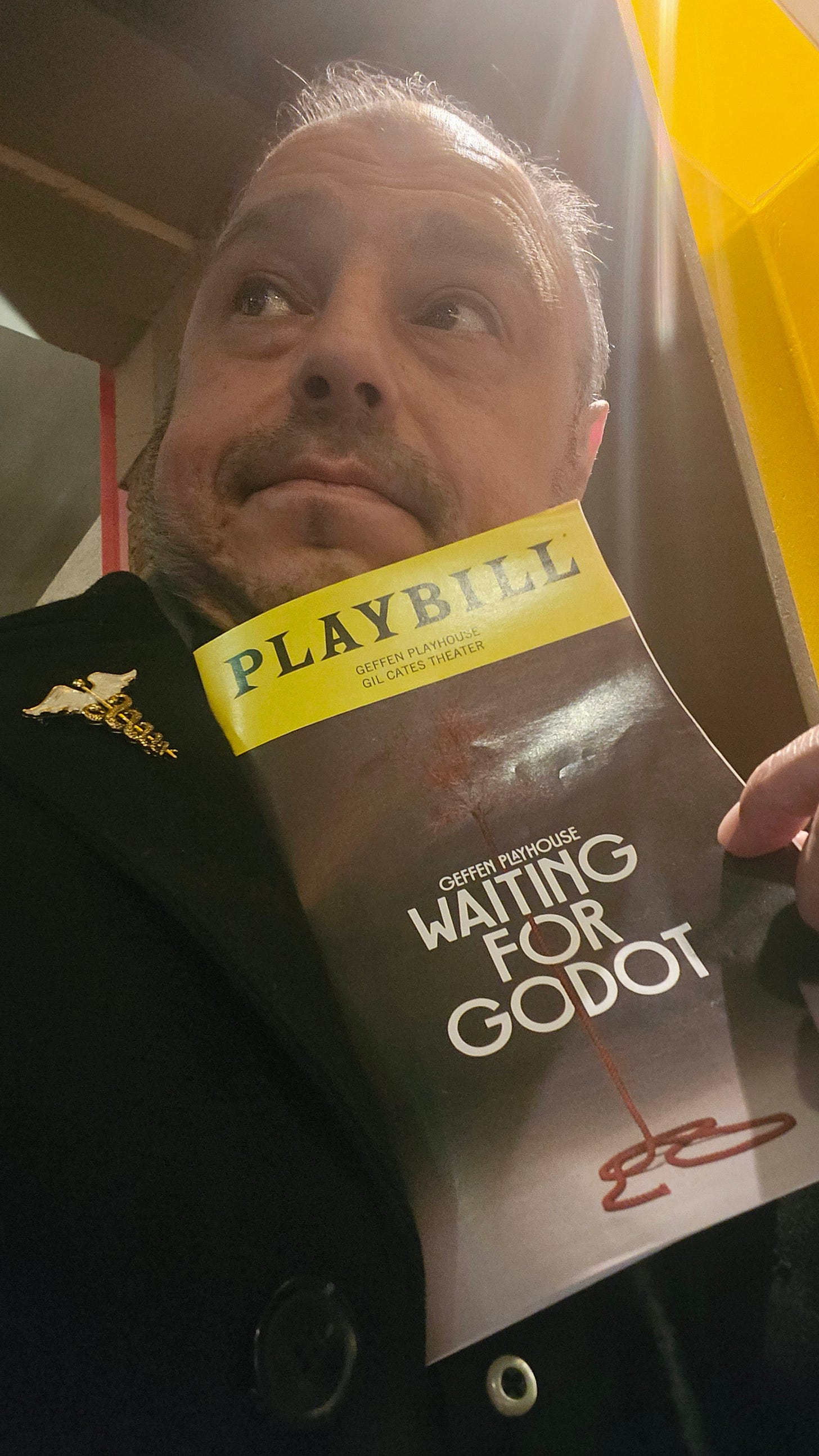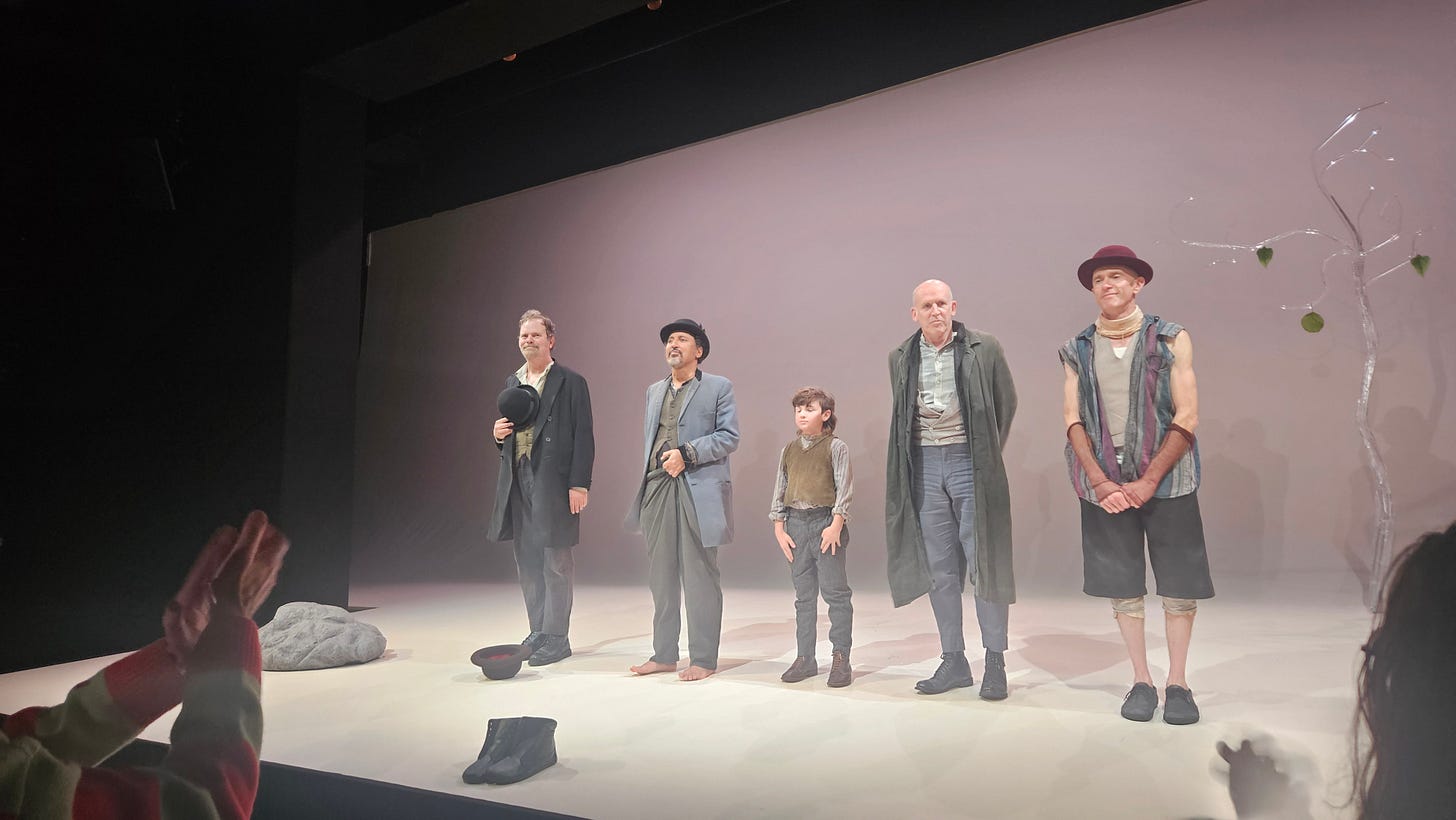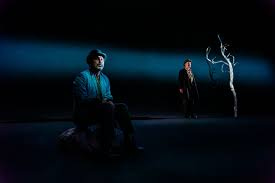Last week, my friend and I attended the Geffen Playhouse’s production of Samuel Beckett’s Waiting for Godot, featuring Rainn Wilson as Vladimir and Aasif Mandvi as Estragon. It was a profoundly moving experience, not just because of the play itself, but because it brought back memories of my own time on that very stage in 1999, when I was a young actor performing in Merton of the Movies. Seeing the Geffen’s timeless dedication to theatrical excellence reminded me of the transformative power of this art form and the unique intimacy that this venue fosters between actors and audience.
The Play and Its Legacy
Waiting for Godot is a masterpiece that has defined modern theater for over seventy years. First performed in 1953, it tells the story of two vagabonds, Vladimir (Didi) and Estragon (Gogo), who wait endlessly by a barren tree for a man named Godot. Their waiting is punctuated by repetitive, often nonsensical conversations, bizarre encounters with characters like the domineering Pozzo and his subjugated servant Lucky, and fleeting messages from a boy claiming Godot will come—though he never does.
The play’s beauty lies in its ambiguity. Interpretations have ranged from religious allegories to existential meditations on the absurdity of life, to reflections on post-World War II despair. Some see it as a commentary on human dependency or the paralysis of inaction. Samuel Beckett himself resisted imposing any definitive meaning, which has only added to its allure. Its minimalism and stark existential themes, combined with its surprising humor, have made it one of the most iconic plays of the 20th century.
Beckett’s Background
Samuel Beckett, an Irish-born writer and Nobel laureate, was a master of minimalism and existential thought. Born in Dublin in 1906, Beckett studied at Trinity College and later moved to Paris, where he was deeply influenced by James Joyce. During World War II, Beckett joined the French Resistance, an experience that deeply informed his later works. His writing often explores the themes of human suffering, the passage of time, and the absurdity of existence, all rendered with a wry sense of humor. Waiting for Godot remains his most famous work, a landmark of the Theater of the Absurd.
Returning to the Geffen Playhouse
Walking into the Geffen Playhouse, I was immediately reminded of my own time there as an actor in Merton of the Movies. The memories of rehearsals, performances, and the shared camaraderie of the cast flooded back. Performing on that stage taught me about the discipline and vulnerability required to bring stories to life, lessons that deepened my appreciation for the incredible work I witnessed last week.
The current production of Waiting for Godot upheld the Geffen’s reputation for excellence. The minimalist set—a barren tree and a single rock—perfectly captured the starkness of Beckett’s world. The subtle lighting shifts from dawn to dusk underscored the cyclical nature of the characters’ wait, drawing the audience into their suspended, endless moment in time.
Rainn Wilson and Aasif Mandvi gave exceptional performances. Wilson’s Vladimir was particularly captivating, blending intelligence, humor, and despair into a portrayal that felt both human and otherworldly. Mandvi’s Estragon brought a raw emotionality that grounded the production, creating a perfect counterbalance to Wilson’s more cerebral take. Their chemistry was palpable, their timing impeccable, and their ability to navigate Beckett’s complex dialogue was impressive.
That said, I felt the production leaned slightly into overt absurdity, which at times undermined the ethereal detachment intrinsic to Beckett’s characters. Vladimir and Estragon are clowns—fools wandering through a senseless universe—but the comedy should emerge naturally from their situation, with the absurdity felt by the audience, not overtly acknowledged by the characters. This subtle balance is key to the play’s existential weight, and while this production was close, it occasionally tipped the scale toward self-awareness.
Despite this minor critique, the production was riveting. At two and a half hours, it held the audience’s attention effortlessly, and any minor stumbles in the dialogue were so seamless they were barely noticeable. Sitting in the second row, I was fully immersed in the intimacy and immediacy of the performance.
Waiting for Godot at the Geffen Playhouse was more than just a theatrical performance; it was a reminder of why Beckett’s work endures. The play’s themes of hope, despair, and the human condition are as relevant today as they were at its premiere. Watching it unfold on the same stage where I once performed felt like a full-circle moment—an affirmation of the transformative power of theater and its ability to connect us to something deeper.
It is a must-see, a production that does justice to Beckett’s genius while offering a fresh, thought-provoking interpretation. For anyone who loves theater that challenges and enriches the soul, this is an experience not to be missed.








